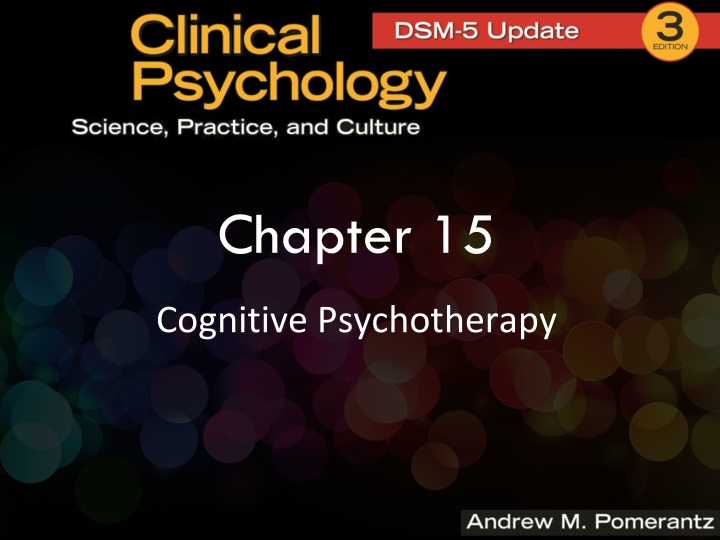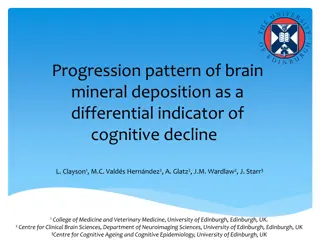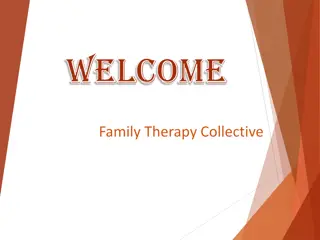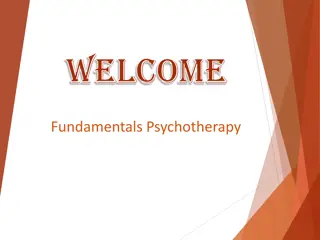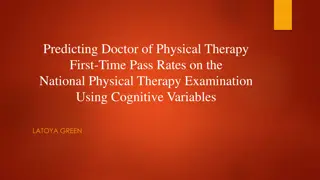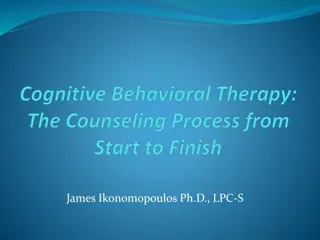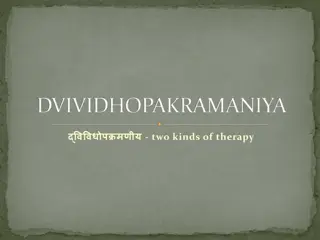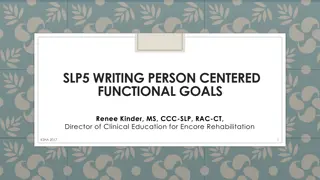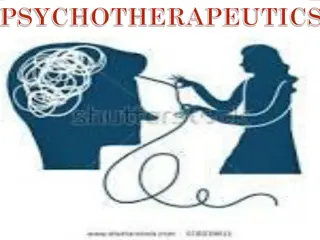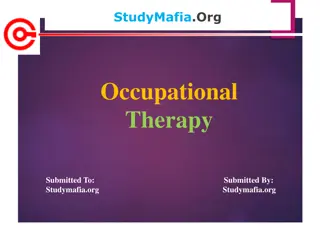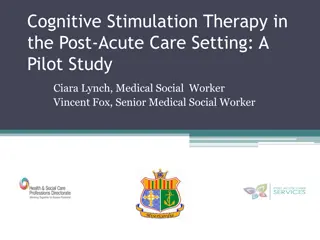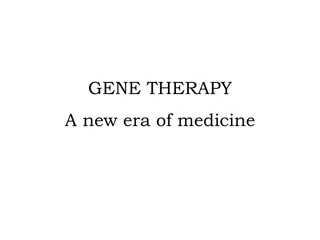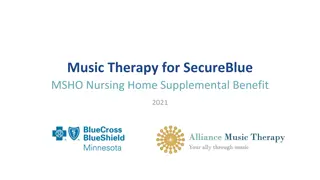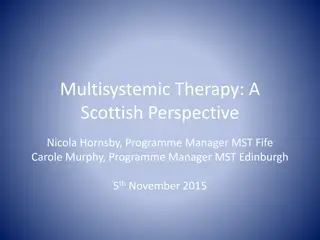Strategies for Effective Cognitive Therapy
Delve into the principles and techniques of cognitive psychotherapy to address various mental health issues and promote positive change. This chapter provides a comprehensive overview of how cognitive therapy can be applied in clinical settings, offering insights into the therapeutic process and highlighting key strategies for enhancing therapeutic outcomes. Gain a deeper understanding of the cognitive approach to psychotherapy and its practical applications in helping individuals develop healthier thought patterns and behaviors.
Download Presentation

Please find below an Image/Link to download the presentation.
The content on the website is provided AS IS for your information and personal use only. It may not be sold, licensed, or shared on other websites without obtaining consent from the author.If you encounter any issues during the download, it is possible that the publisher has removed the file from their server.
You are allowed to download the files provided on this website for personal or commercial use, subject to the condition that they are used lawfully. All files are the property of their respective owners.
The content on the website is provided AS IS for your information and personal use only. It may not be sold, licensed, or shared on other websites without obtaining consent from the author.
E N D
Presentation Transcript
Chapter 15 Cognitive Psychotherapy
Cognitive Psychotherapy Cognitive therapy has risen in popularity in recent decades Currently, more clinical psychologists endorse it than any other single-school approach to therapy Represents a reaction to both behavioral and psychodynamic therapy
Goal of Cognitive Therapy Increase in logical thinking, or fix faulty thinking The way we think about or interpret events determines the way we respond emotionally
Importance of Cognition Cognition can also be called thought, belief, or interpretation Although we often describe our feelings as stemming directly from events, cognitions actually intervene Events don t make us happy or sad. Instead, the way we think about those events does. Those interpretations influence our feelings Things happen We interpret those things
Revising Cognitions If cognitions determine feelings, revising illogical cognitions can lead to more appropriate emotional reactions If cognitions are more extreme than warranted, unwanted feelings can unnecessarily occur Three steps to revising cognitions: Identify illogical cognitions (automatic thoughts) Challenge them Replace them with more logical cognitions Regarding culture, are some beliefs too sacred to dispute?
Teaching as a Therapy Tool Cognitive therapists often function as teachers with clients Educate clients about the cognitive model Use handouts, mini-lectures, readings Written assignments/homework Aspire for clients to ultimately be able to use the lessons learned to teach themselves rather than remaining dependent on the teacher
Homework Cognitive therapists often assign homework between sessions Written Keep a record of events, interpretations, and feelings Behavioral Perform certain behaviors to examine the validity of a cognition that may be illogical
A Brief, Structured, Focused Approach Cognitive therapy is typically: Relatively brief often 15 sessions or less Structured and planned Sessions may not be as free-flowing or spontaneous as in other therapies Focused on particular goals determined by client and therapist at the outset
Two Approaches to Cognitive Therapy Albert Ellis His approach is known as Rational Emotive Behavior Therapy (REBT) Despite the word behavior in the name, it is cognitive (not behavioral) therapy Emphasizes a connection between rationality and emotion
Two Approaches to Cognitive Therapy (cont.) Albert Ellis (cont.) ABCDE model Activating Event Belief Emotional Consequence Dispute Effective New Belief These five columns provide a format for written records of client experiences Also provide a model of understanding and change for client
ABCDE Model Example A Activating Event Studying for or thinking about the CPA exam B Belief I absolutely have to pass the CPA exam on my first attempt ; If I don t pass the CPA exam on my first attempt, my career is doomed, and that would destroy me. C Emotional Consequence Anxiety D Dispute Who says you have to pass the CPA exam on your first attempt? I understand that s a preference, but is it a life-or-death necessity? Realistically, don t quite a few accountants fail the CPA exam on their first try? And don t many of them pass it later and go on to have successful careers? And even if you don t end up with the career in accounting that you envisioned, does that mean your life is ruined? There are plenty of ways for you to have a rewarding career that don t involve accounting at all. E Effective New Belief I want to pass the CPA exam my on my first attempt, but it s not an absolute necessity. If I pass it on a later attempt, that will probably work out fine also, and in the big picture, my happiness doesn t depend entirely on following the career path I ve imagined.
Two Approaches to Cognitive Therapy (cont.) Aaron Beck Daughter Judith Beck has become a leading figure as well General term cognitive therapy is label for his approach Dysfunctional Thought Record instead of ABCDE format for recording client experiences Different column headings, but similar concepts
Two Approaches to Cognitive Therapy (cont.) Aaron Beck (cont.) Common thought distortions All-or-nothing thinking (no gray area) Catastrophizing (unrealistically expecting the worst) Magnification/minimization (mountain out of molehill) Personalization (assume too much responsibility) Overgeneralization (negative thoughts applied too broadly) Mental filtering (ignoring positive events and focusing only on negative events) Mind reading (presuming to know what others think)
Two Approaches to Cognitive Therapy (cont.) Aaron Beck (cont.) Beliefs as hypotheses Our beliefs are hypotheses , even though we may live as if they are proven facts Therapy can involve putting these beliefs to the test to see if they hold true
Recent Applications of Cognitive Therapy Mindfulness- and acceptance-based therapies Known as third wave therapies Mindfulness involves full attention to present moment without judging or wishing things were otherwise Engage with own mental process rather than experiential avoidance Derives from Buddhist tradition
Recent Applications of Cognitive Therapy (cont.) Specific third wave therapies: Acceptance and Commitment Therapy Dialectical Behavior Therapy Metacognitive Therapy
Acceptance and Commitment Therapy (ACT) Steven C. Hayes Learn to accept internal psychological experience Commit to one s own personal values Move from FEAR to ACT
Dialectical Behavior Therapy (DBT) Marsha Linehan Treatment of borderline personality disorder (BPD) BPD conceptualized as problem of emotional regulation Core practices of DBT Problem solving Validation Dialectics
DBT (cont.) Four specific modules of skills training Emotion regulation Distress tolerance Interpersonal effectiveness Mindfulness skills
Metacognitive Therapy Metacognition = thinking about thinking The activating event can be a cognition itself The cause of unhappiness is our thoughts about our thoughts Metacognitive therapists make thinking about thinking the primary focus
Recent Applications of Cognitive Therapy (cont.) Cognitive therapy for medical problems The way patients think about injury, illness, or condition can be powerful, especially when irrational Increasing logical thinking can improve mental and physical health Has been successfully applied to a variety of medical problems
How Well Does Cognitive Therapy Work? Efficacy of cognitive therapy is strongly supported by a body of empirical evidence that is large and continues to grow Empirical support for treatment of many disorders, including depression, anxiety disorders, bulimia, PTSD, and others Cognitive therapists often conduct therapy in a manner that facilitates empirical study
